Directory A–Z
Customs Regulations
Climate
Discount Cards
Electricity
Embassies & Consulates
Food & Drink
Gay & Lesbian Travellers
Health
Insurance
Internet Access
Legal Matters
Maps
Money
Opening Hours
Post
Public Holidays
Safe Travel
Telephone
Time
Toilets
Tourist Information
Travellers with Disabilities
Visas
Volunteering
Women Travellers
Work
Directory A–Z
Customs Regulations
Most articles you take into Sardinia for personal use can be imported free of duty and tax. The following allowances apply to duty-free goods purchased in a non-EU country. In addition you can bring in other products up to a value of €430.
AAlcohol 1L spirits (or 2L fortified wine), 4L still wine
AOther goods 60mL perfume, 16L beer, 200 cigarettes
ACash Up to €10,000
Climate
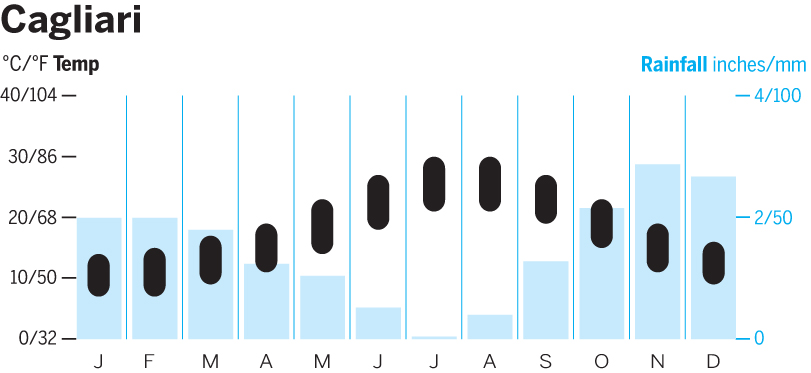
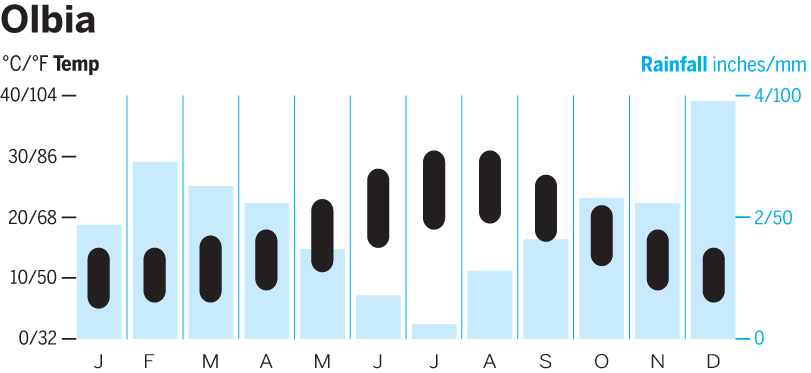
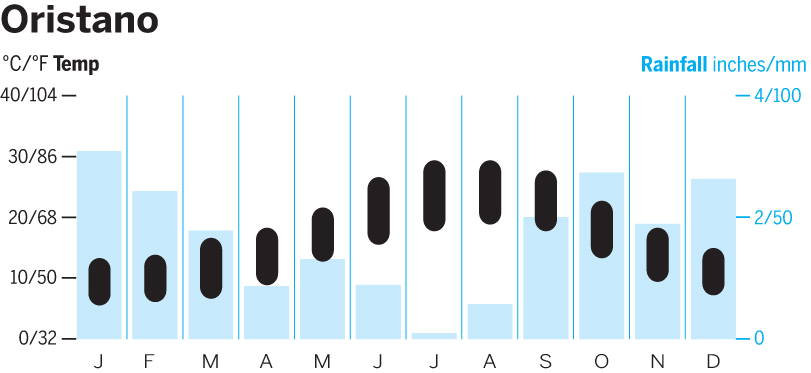
Discount Cards
AThose under 18 years and over 65 are often entitled to free or discounted admission to state-run museums and cultural sights. To claim your discount take proof of your age, ideally an ID card or passport.
AInternational Student Identity Card (ISIC; www.isic.org) entitles students to various shopping, accommodation and museum discounts in Cagliari, Sassari and Nuoro. A similar card is available to non-students under 26 years, the International Youth Travel Card. The cost varies depending on where you get it, but reckon on about €15.
AEuropean Youth Card (www.euro26.org) offers a wide range of discounts across Europe. Cardholders do not need to be European citizens. It costs €11 if bought in Italy.
AStudent cards are issued by student unions, hostelling organisations and some youth travel agencies. In Cagliari, Sassari and Nuoro, the Centro Turistico Studentesco e Giovanile (www.cts.it) youth travel agency can issue ISIC and IYTC cards and the European Youth Card.
Electricity
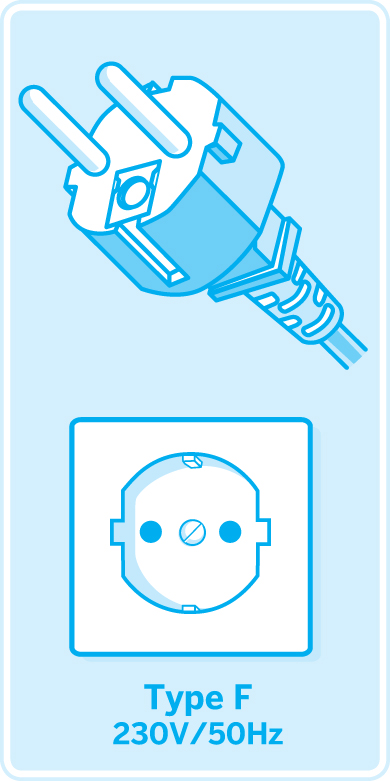
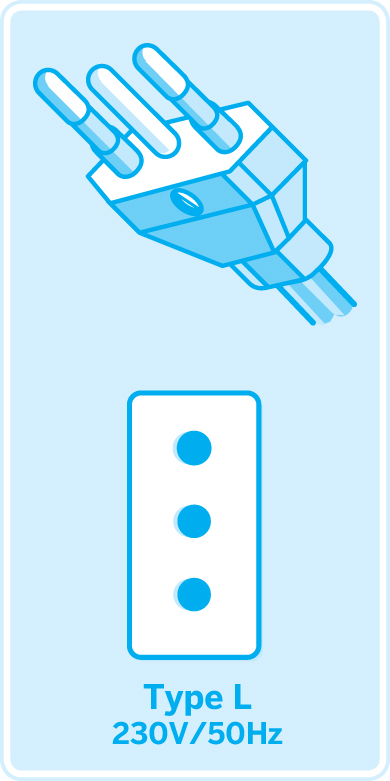
Embassies & Consulates
Most countries have an embassy in Rome, and several also maintain an honorary consulate in Cagliari. Passport inquiries should be addressed to Rome-based offices.
Australian EmbassyEMBASSY
(
GOOGLE MAP
; ![]() %06 85 27 21, emergencies 800 877790; www.italy.embassy.gov.au; Via Antonio Bosio 5;
%06 85 27 21, emergencies 800 877790; www.italy.embassy.gov.au; Via Antonio Bosio 5; ![]() h9am-5pm Mon-Fri;
h9am-5pm Mon-Fri; ![]() gVia Nomentana)
gVia Nomentana)
British EmbassyEMBASSY
(
GOOGLE MAP
; ![]() %06 4220 0001; www.ukinitaly.fco.gov.uk; Via XX Settembre 80a, Rome)
%06 4220 0001; www.ukinitaly.fco.gov.uk; Via XX Settembre 80a, Rome)
Canadian EmbassyEMBASSY
(
GOOGLE MAP
; ![]() %06 8 5444 2911; www.canadainternational.gc.ca/italy-italie; Via Zara 30;
%06 8 5444 2911; www.canadainternational.gc.ca/italy-italie; Via Zara 30; ![]() h9am-noon Mon-Fri;
h9am-noon Mon-Fri; ![]() gVia Nomentana)
gVia Nomentana)
Dutch EmbassyEMBASSY
(
GOOGLE MAP
; ![]() %06 3228 6001; www.olanda.it; Via Michele Mercati 8;
%06 3228 6001; www.olanda.it; Via Michele Mercati 8; ![]() h9am-noon Mon-Wed & Fri, 10am-noon & 2-4pm Thu;
h9am-noon Mon-Wed & Fri, 10am-noon & 2-4pm Thu; ![]() jVia Ulisse Aldrovandi)
jVia Ulisse Aldrovandi)
French EmbassyEMBASSY
(
GOOGLE MAP
; ![]() %06 68 6011; www.ambafrance-it.org; Piazza Farnese 67)
%06 68 6011; www.ambafrance-it.org; Piazza Farnese 67)
Housed in the Renaissance Palazzo Farnese.
German EmbassyEMBASSY
(
GOOGLE MAP
; ![]() %06 49 21 31; www.rom.diplo.de; Via San Martino della Battaglia 4, Rome)
%06 49 21 31; www.rom.diplo.de; Via San Martino della Battaglia 4, Rome)
Irish EmbassyEMBASSY
(
GOOGLE MAP
; ![]() %06 585 23 81; www.ambasciata-irlanda.it; Via Giacomo Medici 1, Villa Spada)
%06 585 23 81; www.ambasciata-irlanda.it; Via Giacomo Medici 1, Villa Spada)
New Zealand EmbassyEMBASSY
(
GOOGLE MAP
; ![]() %06 853 75 01; www.mfat.govt.nz/en/countries-and-regions/europe/italy/new-zealand-embassy; Via Clitunno 44;
%06 853 75 01; www.mfat.govt.nz/en/countries-and-regions/europe/italy/new-zealand-embassy; Via Clitunno 44; ![]() h8.30am-12.30pm & 1.30-5pm Mon-Fri;
h8.30am-12.30pm & 1.30-5pm Mon-Fri; ![]() gCorso Trieste)
gCorso Trieste)
US EmbassyEMBASSY
(
GOOGLE MAP
; ![]() %06 4 67 41; www.italy.usembassy.gov; Via Vittorio Veneto 121, Rome)
%06 4 67 41; www.italy.usembassy.gov; Via Vittorio Veneto 121, Rome)
Food & Drink
For detailed information on eating and drinking in Sardinia, see The Sardinian Kitchen (click here).
EATING PRICE RANGES
The following price ranges refer to a two-course meal including a glass of house wine and coperto (cover charge) for one person.
€ less than €25
€€ €25 to €45
€€€ more than €45
Gay & Lesbian Travellers
Although homosexuality is legal, Sardinian attitudes remain largely conservative. There is practically no open gay scene on the island and overt displays of affection could attract unpleasant attention, especially in the rural interior.
AThe most tolerant places are the island’s two largest cities, Sassari and Cagliari.
AThe island’s most high-profile gay activist organisation is the Sassari-based Movimento Omosessuale Sardo. Check out its website for listings and information on gay-friendly accommodation, clubs and beaches.
AAlso useful is the national gay organisation Arcigay (www.arcigay.it).
ASardegna Pride takes to the seafront streets of Cagliari in June.
Health
Before You Go
Health Insurance
AThe European Health Insurance Card (EHIC) entitles EU citizens and nationals of Switzerland, Iceland, Norway and Liechtenstein to free or reduced-cost state-provided health care for emergency treatment in Sardinia or other parts of Italy.
AThe card is available from health centres and, in some countries, online. For more information see https://ehicdirect.org.uk. In the UK, get application forms from post offices or download them from the Department of Health (www.dh.gov.uk) website.
AThe EHIC does not cover private health care, so make sure that you are treated by a state health-care provider. You will need to pay directly and fill in a treatment form; keep the form to claim any refunds. In general, you can claim back around 70% of the standard treatment cost.
ACitizens from other countries should check if there is a reciprocal arrangement for free medical care between their country and Italy. Australia, for instance, has such an agreement – carry your Medicare card.
AIf you need health insurance, make sure you get a policy that covers you for the worst possible scenario, such as an accident requiring an emergency flight home.
AFind out in advance if your insurance plan will make payments directly to providers or reimburse you later for overseas health expenditures.
Vaccinations
No vaccinations are required to travel to Sardinia, though the World Health Organization (WHO) recommends that all travellers should be covered for diphtheria, tetanus, the measles, mumps, rubella, polio and hepatitis B.
In Sardinia
Availability & Cost of Health Care
Health care is readily available throughout Sardinia, but standards can vary. Pharmacists are able to advise when more specialised help is required and point you in the right direction.
AFarmacie (pharmacies), marked by a green cross, can give medical advice and sell over-the-counter medication for minor illnesses. They can advise when more specialised help is required and point you in the right direction.
APharmacies generally keep the same hours as shops, typically from around 9am to 1pm and 4.30pm to 8pm Monday to Friday and on Saturday mornings. Closed pharmacies display a list of the nearest ones that are open.
AFor emergency treatment, go to the pronto soccorso (casualty) section of a public hospital, where you can also get emergency dental treatment.
AAvailable in most towns, the on-call Guardia Medica service offers assistance throughout the night (8pm to 8am) on weekends and on public holidays. It does not provide emergency care (for that go to the pronto soccorso).
Environmental Hazards
AMosquitoes are a real nuisance around low-lying marshy areas such as Cabras and Olbia, especially if you are camping. Pack mosquito repellent in summer as a matter of course.
AJellyfish are not uncommon in Sardinian waters. But while their stings are painful, they're not dangerous. Dousing in vinegar will deactivate stingers that have not fired. Calamine lotion, antihistamines and analgesics may reduce the reaction and relieve pain.
Tap Water
Tap water is safe to drink in Sardinia, although many islanders prefer to buy bottled acqua minerale (mineral water), either frizzante (sparkling) or naturale (still).
Insurance
ATravel insurance to cover theft, loss and medical problems is highly recommended. It may also cover you for cancellation, delays to your travel arrangements or an emergency flight home.
ACheck your policy covers any activities you might be planning such as diving, motorcycling, climbing, even trekking.
AFind out in advance if your insurance plan will make payments directly to providers or reimburse you later. If the latter, make sure you keep all documentation.
AWorldwide travel insurance is available at www.lonelyplanet.com/travel-insurance. You can buy, extend and claim online anytime – even if you’re already on the road.
Internet Access
AFree wi-fi is available in most hostels, B&Bs and hotels, as well as many cafes and restaurants.
ADue to the widespread availability of wi-fi, internet cafes are a dying breed, although you can still find them in major cities such as Cagliari and Alghero. Access typically costs €5 per hour.
ANote also that whenever you use an internet cafe you’re legally obliged to show an ID card or passport.
ASome hotels provide a computer for guest use.
Legal Matters
AItaly has tough drug laws. If caught with 5g of cannabis you can, in theory, be prosecuted as a trafficker. Those caught with amounts below this threshold can be subject to minor penalties.
AThe legal limit for a driver’s blood-alcohol reading is 0.05%. Random breath tests do occur.
AIf you are detained for any alleged offence, you should be given verbal and written notice of the charges laid against you within 24 hours.
AYou have no right to a phone call upon arrest, but you can choose not to respond to questions without the presence of a lawyer.
Maps
For travelling around the island, a good-quality map is very useful. The Touring Club Italiano's Touring Editore (www.touringclub.com) does an excellent island map at a scale of 1:200,000. It's available online or at bookshops in Sardinia.
Money
ASardinia’s unit of currency is the euro (€), which is divided into 100 cents.
ACoin denominations are one, two, five, 10, 20 and 50 cents and €1 and €2. The euro notes come in denominations of €5, €10, €20, €50, €100, €200 and €500.
AExchange money in banks, post offices and exchange offices.
ABanks generally offer the best rates, but shop around as rates tend to fluctuate considerably.
ACredit cards are not always accepted, especially in many B&Bs, cheaper trattorias and other smaller establishments, so bring enough cash.
ATMs
AATMs (known as 'Bancomat' in Italy) are widely available throughout Italy, and most will accept cards tied into the Visa, MasterCard, Cirrus and Maestro systems.
ABeware of transaction fees. Every time you withdraw cash, you'll be hit by charges – typically your home bank will charge a foreign-exchange fee (usually around 1%) as well as a transaction fee of around 1% to 3%. Fees can sometimes be reduced by withdrawing cash from banks affiliated with your home banking institution; check with your bank.
AIf an ATM rejects your card, try another one before assuming the problem is with your card.
AIf your card is lost, stolen or swallowed by an ATM, you can telephone toll-free to have an immediate stop put on its use:
American Express (Amex; ![]() %06 7290 0347)
%06 7290 0347)
Diners Club (![]() %800 393939)
%800 393939)
MasterCard (![]() %800 870866)
%800 870866)
Visa (![]() %800 819014)
%800 819014)
Credit Cards
AMajor cards such as Visa, MasterCard, Eurocard, Cirrus and Eurocheques are widely accepted. Amex is also recognised, although it’s less common than Visa or MasterCard.
AVirtually all midrange and top-end hotels accept credit cards, as do most restaurants and large shops. Some cheaper pensioni, trattorias and pizzerias only accept cash.
ADo not rely on credit cards at museums or galleries.
ANote that using your credit card in ATMs can be costly. On every transaction there’s a fee, which can reach US$10 with some credit-card issuers, as well as interest per withdrawal. Check with your issuer before leaving home.
AAlways inform your bank of your travel plans to avoid your card being blocked for payments made in unusual locations.
Taxes & Refunds
Value-added-tax (VAT) is a 22% sales tax levied on most goods and services. To reclaim VAT on purchases made in tax-free shops, visit www.globalblue.com.
Tipping
Italians are not big tippers. Use the following as a rough guide:
Taxis Optional, but most people round up to the nearest euro.
Hotels Tip porters about €5 at high-end hotels.
Restaurants Service (servizio) is generally included in restaurants – if it's not, a euro or two is fine in pizzerias, 10% in restaurants.
Bars Optional, though many Italians leave small change on the bar when ordering coffee (usually €0.10 per coffee). If drinks are brought to your table, a small tip is generally appreciated.
Opening Hours
AOpening hours vary throughout the year depending on season and location. In some smaller, more out-of-the-way places, business hours might simply depend on how long the owner decides to stay open.
AHours listed in reviews are generally high-season opening hours; hours will generally decrease in the shoulder and low seasons. 'Summer' times generally refer to the period from May to September or October.
Post
AItaly’s, and by association Sardinia’s, postal system Poste Italiane (![]() %803 160; www.poste.it) is reasonably reliable.
%803 160; www.poste.it) is reasonably reliable.
AFrancobolli (stamps) are available at post offices and tabacchi (tobacconists) – look for the official sign, a big white ‘T’ against a blue-black background.
APost offices are widespread in towns and cities, and most villages and resorts have tabacchi.
PRACTICALITIES
AWeights & Measures The metric system is used.
ASmoking Banned in all enclosed public spaces.
ANewspapers Key newspapers include Cagliari’s L’Unione Sarda (www.unionesarda.it) and Sassari’s La Nuova Sardegna (lanuovasardegna.gelocal.it).
ARadio Radiolina (www.radiolina.it) is a popular local radio station. National stations RAI-1, RAI-2 and RAI-3 (www.rai.it) play a mix of phone-ins, sport, news and music.
ATV Local TV channels, Videolina (www.videolina.it) and Sardegna 1 (www.sardegna1.tv) are usually pretty dire, pumping out news, football and traditional costumed dancing. National channels include the state-run RAI-1, RAI-2 and RAI-3.
Public Holidays
Most Italians take their annual holiday in August. Settimana Santa (Easter Week) is another busy holiday period. National public holidays:
Capodanno (New Year’s Day) 1 January
Epifania (Epiphany) 6 January
Pasqua (Easter Sunday) March/April
Pasquetta (Easter Monday) March/April
Giorno della Liberazione (Liberation Day) 25 April
Festa del Lavoro (Labour Day) 1 May
Festa della Repubblica (Republic Day) 2 June
Ferragosto (Feast of the Assumption) 15 August
Ognissanti (All Saints’ Day) 1 November
Immacolata Concezione (Feast of the Immaculate Conception) 8 December
Natale (Christmas Day) 25 December
Festa di Santo Stefano (Boxing Day) 26 December
Safe Travel
Sardinia is a safe island, but use common sense.
AStash away your valuables and lock hire cars.
AIn case of theft or loss, report the incident at the questura (municipal police station) within 24 hours and ask for a statement, otherwise your travel-insurance company won’t pay up.
Telephone
ATo call Sardinia from abroad, dial your international access number, Italy's country code (39) and then the local number (including the area code with the leading ![]() %0).
%0).
ATo call abroad from Sardinia, dial ![]() %00 to get out of Italy and then the relevant country and area codes, followed by the telephone number.
%00 to get out of Italy and then the relevant country and area codes, followed by the telephone number.
AMobile phone numbers begin with a three-figure prefix, typically ![]() %330,
%330, ![]() %331 etc.
%331 etc.
ASardinian area codes all begin with ![]() %0 and consist of up to four digits. Always dial the area code, even when calling locally. Toll-free (free-phone) numbers, known as numeri verdi, usually start with
%0 and consist of up to four digits. Always dial the area code, even when calling locally. Toll-free (free-phone) numbers, known as numeri verdi, usually start with ![]() %800.
%800.
AThe cheapest way to place international calls from Sardinia is via free or low-cost apps such as Skype and Viber, connecting by using the wi-fi at your accommodation or at a cafe or other venue offering free wi-fi.
Mobile Phones
AAs of June 2017, roaming charges no longer apply in the EU. Australian mobiles must be set up for international roaming.
AUS cell phones that operate on the 900 MHz and 1800 MHz frequencies work in Sardinia.
AThe cheapest way of using your mobile is to buy a prepaid (prepagato) Italian SIM card, readily available at phone and electronic stores throughout Sardinia. TIM (www.tim.it), Wind (www.wind.it), Vodafone (www.vodafone.it) and Tre (www.tre.it) all offer SIM cards. These must be officially registered at time of purchase, so make sure you have a passport or ID card with you when you buy one.
AYou can easily top up your Italian SIM with a recharge card (ricarica), available from most tobacconists, some bars, supermarkets and banks.
Time
ASardinian time is one hour ahead of GMT/UTC.
ADaylight-saving time, when clocks are moved forward one hour, commences on the last Sunday in March. Clocks are put back an hour on the last Sunday in October.
AItaly operates on a 24-hour clock, so 6pm is written as 18.00.
AThe following times do not take daylight-saving time into account.
| City | Noon in Cagliari |
|---|---|
| Auckland | 11pm |
| Berlin | noon |
| Cape Town | noon |
| London | 11am |
| New York | 6am |
| San Francisco | 3am |
| Sydney | 9pm |
| Tokyo | 8pm |
Toilets
AMost toilets in Sardinia are of the Western-style, sit-down variety.
APublic toilets are not widespread. If you're caught short, nip into a cafe or bar, all of which are required by law to have a toilet.
Tourist Information
Tourist information is widely available in Sardinia, although the quality varies tremendously. On the whole, offices in important tourist centres such as Alghero, Cala Gonone, Santa Teresa di Gallura and Villasimius are efficient and helpful, with English-speaking staff.
Sardegna Turismo (www.sardegnaturismo.it) For the lowdown on the island online.
Italia (www.italia.it) Multilingual site of the Italian State Tourist Office.
Alghero Helpful tourist office in the town's centre.
Cagliari Main island tourist office in the capital.
Olbia This should be your first port of call for information on Olbia.
Travellers with Disabilities
Sardinia has little infrastructure to ease the way for travellers with disabilities, and few museums and monuments are wheelchair accessible. Footpaths are generally well maintained, though the access to some of the island's more remote beaches is on rough, off-road dirt tracks.
ARete Ferroviaria Italiana Provides assistance for train travel; two dedicated telephone lines are active between 6.45am and 9.30pm daily.
AItalia (www.italia.it) The Italian State Tourist Office's official site may be able to provide advice on associations for travellers with disabilities.
AAccessible Italy (www.accessibleitaly.com) Specialises in holiday services for travellers with disabilities, including tours and the hiring of adapted transport.
For more information download Lonely Planet's free Accessible Travel guide from http://lptravel.to/AccessibleTravel.
Visas
AItaly is part of the Schengen area. There are no customs controls when travelling between Schengen countries, so the visa rules that apply to Italy apply to all Schengen countries.
AThe standard tourist visa for a Schengen country is valid for 90 days and allows unlimited travel within the entire Schengen zone. You must apply for it in the country of your residence and you cannot apply for more than two in any 12-month period. They are not renewable within Italy.
AEU citizens do not need a visa to enter Italy. A valid ID card or passport is sufficient.
ANationals of some other countries, including Australia, Canada, Israel, Japan, New Zealand, Norway, Switzerland and the US do not need a visa for stays of up to 90 days.
Volunteering
AVolunteering opportunities are fairly limited in Sardinia.
AWebsites such as www.transitionsabroad.com have links to organisations offering volunteering positions in Italy and Sardinia. A common request is for mother-tongue English speakers to work at summer schools/camps.
ASome seasonal farm work may be available through organisations such as WWOOF.
Women Travellers
Sardinians are almost universally polite to women, and it is unlikely that you will suffer the sort of harassment that you might in parts of mainland Italy.
It is wise – and polite – to dress modestly in inland Sardinia, however. Communities here are very conservative, and you will still see older women wearing the traditional long, pleated skirts and shawls. Take your cue from the local women.
Work
AHigh unemployment in Sardinia, particularly among young people, means job opportunities are scarce on the island.
ASeasonal work in resorts, bars, restaurants and hotels does exist but most jobs are snapped up by young Sardinians or Italians coming over from the mainland.
AOther possibilities include English-language teaching – in a company, language school or through private lessons – and working as an au pair.
AA useful online resource is Season Workers (www.seasonworkers.com), listing job opportunities on summer resorts.